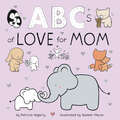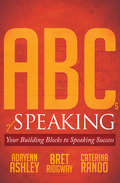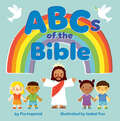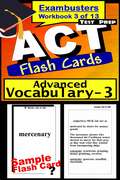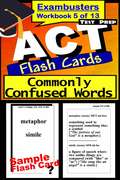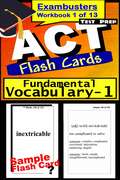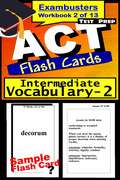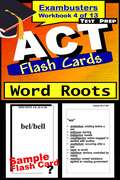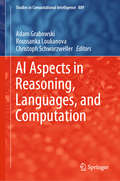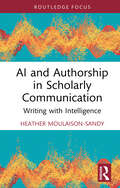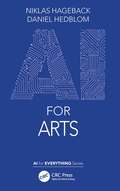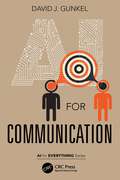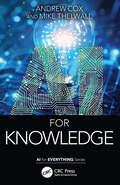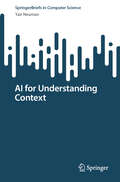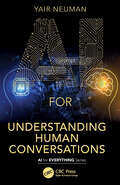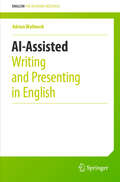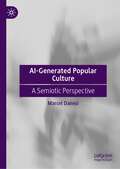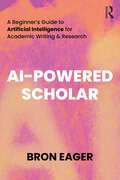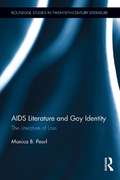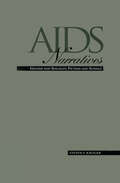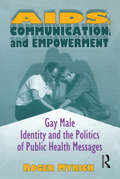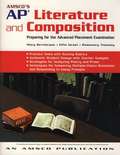- Table View
- List View
ABCs of Love for Mom (Books of Kindness)
by Patricia HegartyMaking Mom feel loved is as easy as A-B-C with this sweet board book that fosters social emotional development—the perfect gift!A is for adoring—we love our moms so much. B is for the beauty of mom's soft, gentle touch. C is for cheerleader—mom is always there for you. Learn your ABCs while celebrating Mom with this irresistibly illustrated board book that's part of the bestselling Books of Kindness series.Featuring an adorable cast of animal characters and showcasing everyday moments of love between mother and child, this rhyming board book is a great tool for fostering social emotional development. And with shiny foil on the cover, it's the perfect gift for Mom!Look for ABCs of Kindness, ABCs of Love, 123s of Kindness, 123s of Thankfulness, Happiness Is a Rainbow, and Friendship Is Forever to complete the set!
ABCs of Speaking: Your Building Blocks to Speaking Success
by Caterina Rando Adryenn Ashley Bret RidgwayAn A–Z primer for all levels of public speaking, from securing engagements to delivering unforgettable speeches to making money as a speaker. Can you make it as a professional speaker? Knowing how to deliver a great presentation is obviously important, but truly understanding how the speaking industry really works is probably even more important. What do you need to know to deal with event promoters? What can you do to take control of the room and not let the unexpected derail your presentation? Should you pursue the fee or free speaking model? What about technology? What do they mean by &‘buying units.&’ Industry insiders Adryenn Ashley, Bret Ridgway, and Caterina Rando share their combined decades of experience from both the platform and the promoter perspectives. They pull back the curtains and give you a sneak peek into how the speaking world really works. You&’ll learn how to build a profitable speaking business that allows you to more effectively build your platform and share your powerful message with the world. Even if you already consider yourself a professional speaker, you&’re guaranteed to pick up a few nuggets that can help you take things to the next level with your speaking. Get more gigs, make more money and impact more lives today!
ABCs of the Bible
by Pia ImperialComplete with short Bible verses, this fun and informative alphabet board book makes for the perfect baby step in a little one&’s journey of faith!A is for Abraham…B is for Baptism…C is for Christ...Featuring key biblical figures, concepts, and locations as well as practices associated with Christianity, this board book offers a great A to Z introduction to the Bible!Charming, kid-friendly art pairs perfectly with simple, accessible text in this board book for the youngest readers.
ACT Test Prep Flash Cards: Advanced Vocabulary Review (Exambusters ACT Workbook #3 of 13)
by Ace Inc.<P><P><i>Advisory: Bookshare has learned that this book offers only partial accessibility. We have kept it in the collection because it is useful for some of our members. Benetech is actively working on projects to improve accessibility issues such as these.</i><P><P> 350 frequently tested ACT words every college freshman should know. <P><P>Perfect for anyone who wants to enrich their vocabulary! Improve your reading comprehension and conversation. Includes sample sentence, part of speech, pronunciation, succinct, easy-to-remember definition, and common synonyms and antonyms.
ACT Test Prep Flash Cards: Commonly Confused Words (Exambusters ACT Workbook #5 of 13)
by Ace Inc.<P><P><i>Advisory: Bookshare has learned that this book offers only partial accessibility. We have kept it in the collection because it is useful for some of our members. Benetech is actively working on projects to improve accessibility issues such as these.</i><P><P> Do you know the difference between "fewer" and "less," when to use "it's" or "its," or how to distinguish between "historical" and "historic" or "tortuous" and "torturous?" <P><P>This course contains 500 pairs of commonly confused words, some so frequently misused that their wrong application has become acceptable to many ears. Includes part of speech, pronunciation, simple definition, and usage example. Mastering the differences will improve your written grammar, verbal communication, and most importantly, your ACT test score! s!
ACT Test Prep Flash Cards: Fundamental Vocabulary (Exambusters ACT Workbook #1 of 13)
by Ace Inc.<P><P><i>Advisory: Bookshare has learned that this book offers only partial accessibility. We have kept it in the collection because it is useful for some of our members. Benetech is actively working on projects to improve accessibility issues such as these.</i><P><P> 300 basic words every high school freshman should know.<P><P> Includes part of speech, pronunciation, succinct, easy-to-remember definition, and common synonyms and antonyms. If vocabulary isn't your strong suit, then review these common ACT words first.
ACT Test Prep Flash Cards: Intermediate Vocabulary (Exambusters ACT Workbook #2 of 13)
by Ace Inc.<P><P><i>Advisory: Bookshare has learned that this book offers only partial accessibility. We have kept it in the collection because it is useful for some of our members. Benetech is actively working on projects to improve accessibility issues such as these.</i><P><P> 500 frequently tested ACT words every high school student should know. <P><P>Perfect for anyone who wants to enrich their vocabulary! Improve your reading comprehension and conversation. Includes sample sentence, part of speech, pronunciation, succinct, easy-to-remember definition, and common synonyms and antonyms.
ACT Test Prep Flash Cards: Word Roots (Exambusters ACT Workbook #4 of 13)
by Ace Inc.<P><P><i>Advisory: Bookshare has learned that this book offers only partial accessibility. We have kept it in the collection because it is useful for some of our members. Benetech is actively working on projects to improve accessibility issues such as these.</i><P><P> A unique collection of 380 essential Word Roots, Prefixes, and Suffixes, each with up to ten derivative word examples and definitions.<P><P>Interpret new words without a dictionary. You'll view language from an entirely new perspective, and raise your ACT test score too!
AGS World Literature
by Ags PublishingThis book is an anthology of world literature with a fine collection of Fiction, Nonfiction, Drama, Poetry, Persuasive Literature, and Humorous Literature.
AI
by Barbara W. MakarA systematic, phonics-based early reading program that includes: the most practice for every skill, decodable readers for every skill, and reinforcement materials--help struggling students succeed in the regular classroom
AI Aspects in Reasoning, Languages, and Computation (Studies in Computational Intelligence #889)
by Roussanka Loukanova Adam Grabowski Christoph SchwarzwellerThis book builds on decades of research and provides contemporary theoretical foundations for practical applications to intelligent technologies and advances in artificial intelligence (AI). Reflecting the growing realization that computational models of human reasoning and interactions can be improved by integrating heterogeneous information resources and AI techniques, its ultimate goal is to promote integrated computational approaches to intelligent computerized systems. The book covers a range of interrelated topics, in particular, computational reasoning, language, syntax, semantics, memory, and context information. The respective chapters use and develop logically oriented methods and techniques, and the topics selected are from those areas of logic that contribute to AI and provide its mathematical foundations.The intended readership includes researchers working in the areas of traditional logical foundations, and on new approaches to intelligent computational systems.
AI and Authorship in Scholarly Communication: Writing with Intelligence
by Heather Moulaison-SandyAI and Authorship in Scholarly Communication explores the role of artificial intelligence (AI) as it pertains to scholarly research and writing.Explaining what AI is and how it can be used by scholars, the book also focuses on aspects with the potential to change the scholarly communication landscape. Bringing together research on AI and writing from the scholarly literature in LIS and beyond, the book weaves together information about essential topics relating to AI and authorship. In laying out the primary concerns surrounding AI in the field of scholarly communication, Moulaison-Sandy considers how those concerns map to norms and practices in research and writing. The book likewise explores the future landscape of scholarly communication, an environment in which AI will continue to play an important role.AI and Authorship in Scholarly Communication will be of great interest to scholars, students, and practitioners and will be particularly useful to those studying AI or authorship from a library and information science (LIS) perspective. Researchers or practitioners working in higher education or with learning technologies will also find much to interest them within the pages of the book.
AI for Arts (AI for Everything)
by Niklas Hageback Daniel HedblomAI for Arts is a book for anyone fascinated by the man–machine connection, an unstoppable evolution that is intertwining us with technology in an ever-greater degree, and where there is an increasing concern that it will be technology that comes out on top. Thus, presented here through perhaps its most esoteric form, namely art, this unfolding conundrum is brought to its apex. What is left of us humans if artificial intelligence also surpasses us when it comes to art? The articulation of an artificial intelligence art manifesto is long overdue, so hopefully this book can fill a gap that will have repercussions not only for aesthetic and philosophical considerations but possibly more so for the development of artificial intelligence.
AI for Communication (AI for Everything)
by David J. GunkelAI for Communication offers an engaging exploration into the diverse applications of artificial intelligence (AI) within the realm of communication. By bridging the gap between the scientific and engineering realms of AI and communication, this book reveals how AI, since its inception during the Dartmouth Summer workshop of 1956, has inherently been a science of communication. Exploring key advancements such as machine translation, natural language processing, large language models, computational creativity, and social robotics, this book shows how these innovations not only disrupt but also actively transform human communication.The book is designed for students, teachers, and general readers who want to know how the field of communication impacts and influences the theory and practice of AI and how recent developments in AI will affect all aspects of human social interaction.
AI for Knowledge (AI for Everything)
by Mike Thelwall Andrew CoxAI for Knowledge explores the question of whether artificial intelligence (AI) is transforming knowledge access and creation for the good. AI is accelerating our access to knowledge through search, recommendation, summarisation, translation and a proliferating range of tools with AI built in. Generative AI is further changing how we use and create information at home and in the workplace. Yet AI also has a dark side with hallucination, bias and lack of explainability, as well as potential for harmful impacts on social equity and the environment.The book investigates how AI will impact everyday knowledge discovery, understanding and creation. It considers both the positive benefits and the many informational and ethical challenges, including the impact on our wider information culture. It then weighs up the impact on scholarship, in science, social science and the humanities and including the processes of scholarly communication. It explains the role of libraries and archives and how they could be enhanced using AI. It concludes by showing how governments can regulate AI to ensure social benefit and outlines what we as individuals need to know about AI.The book helps the reader see through some of the AI hype to understand much more clearly what are the issues around the impact of AI on knowledge access and creation, including the implications for environmental sustainability and the power of Big Tech. What emerges is a nuanced picture of potential benefit and risk, especially when we consider the experiences of those with less privileged access to the digital, particularly those outside the Global North.
AI for Understanding Context (SpringerBriefs in Computer Science)
by Yair NeumanContext is necessary for understanding human behavior. However, so far, the concept of context has mostly been treated in a way that lacks any clear relevance for using, developing and engineering intelligent systems. In this book, the author explains the importance of context for understanding human behavior, presents a theory of context, and shows how AI, specifically Large Language Models such as GPT, can support our understanding of context when analyzing human behavior as expressed in texts ranging from conversations to short stories. Drawing on years of R&D and academic publications in top rated journals, the author provides the reader with a simple and deep understanding of context and its modeling for specific challenges, from identifying social norm violations to understanding conversations going awry and stories by great authors. The book may interest a wide variety of readers seeking to incorporate AI into their understanding of human behavior.
AI for Understanding Human Conversations (AI for Everything)
by Yair NeumanArtificial intelligence (AI) and specifically large language models (LLMs) revolutionize our lives with new technologies appearing at an unprecedented rate. These technologies can potentially change how we understand human conversations, from the dialogues of married couples to diplomatic conversations.This book explains how to use LLMs to analyze human conversations and how better LLMs can be developed by incorporating a deep theoretical understanding.Drawing on case studies from Pulp Fiction to diplomatic meetings, the book provides detailed, approachable, and theoretically grounded explanations of how LLMs can help us understand conversations.
AI-Assisted Writing and Presenting in English (English for Academic Research)
by Adrian WallworkThis book is part of the English for Academic Research series. It shows university students and researchers how to optimize their use of chatbots and machine translation in order to correct the English usage of a research paper, and write emails, letters, and presentation scripts and slides in English. English-speaking language editors, translators, and EAP teachers will also find this book useful. The main focus is on ChatGPT and Google Translate. However the techniques proposed will also work with equivalent tools. You will learn the areas where ChatGPT works well: correcting, improving, paraphrasing, reducing, and summarizing texts; generating / suggesting texts; answering queries; and simulating academic scenarios. A key strategy for enhancing the output of machine translation is to pre-edit and post-edit your texts – this book tells you how. You will also learn what ChatGPT is currently NOT able to do, e.g. differentiating between ‘essential’ and ‘non-essential’; listing all the changes it has made; highlighting your key findings; and advising you when you have written too much, plagiarized, used biased language, or forgotten to mention the limitations of your work. The book lists over 170 prompts that you can use with a chatbot. The author recommends using ChatGPT as an assistant, but not for generating an entire paper. Adrian Wallwork edits scientific papers and teaches English for Academic Purposes (EAP) to PhD students. In addition to his many books for Springer, he has written course books for Oxford University Press and discussion books for Cambridge University Press. He is passionate about exploiting the advances in artificial intelligence to help researchers around the world write and publish their work.
AI-Generated Popular Culture: A Semiotic Perspective
by Marcel DanesiThis book gives a general overview of Artificial Intelligence as it is impacting on the world of the arts and culture. What is AI-generated pop culture? What does a movie, a musical work, a novel, or song created entirely by a generative AI imply in terms of our notions of creativity? What is the semiotic dynamic (the meaning-making impulse that humans imprint in sign and textual forms) that is involved in an AI-produced work? No comprehensive treatment exists of the profound implications that AI-generated pop culture entails, including how it might affect cultural evolution and how we interpret artistic artifacts. Such a treatment is critical at this moment, and this book aims to fill this gap.
AI-Powered Scholar: A Beginner’s Guide to Artificial Intelligence for Academic Writing & Research
by Bron EagerThis book is a practical and comprehensive guide on using AI tools to streamline and optimise the academic writing and research process.Through a series of step-by-step instructions and practical tips, this book provides readers with the knowledge and tools they need to leverage the power of AI to produce high-quality academic publications. The text covers the historical context of AI development, techniques for communicating with AI systems, and strategies for transforming AI into helpful research assistants. Readers will discover the art of prompt engineering and learn practical applications for using AI to ideate research projects, conduct literature searches, and accelerate academic writing. Emphasis is placed on the responsible use of AI, positioning it as an extension of human capabilities rather than a replacement. Through real-world examples, complex AI concepts are demystified, and key challenges and limitations are addressed head-on.Whether you're a university student or a tenured professor, this book is your indispensable companion to beginning your path towards becoming an AI-powered scholar.
AIDS Literature and Gay Identity: The Literature of Loss (Routledge Studies in Twentieth-Century Literature)
by Monica B. PearlThis book discusses the significance of late twentieth century and early twenty first century American fiction written in response to the AIDS crisis and interrogates how sexual identity is depicted and constructed textually. Pearl develops Freudian psychoanalytic theory in a complex account of the ways in which grief is expressed and worked out in literature, showing how key texts from the AIDS crisis by authors such as Edmund White, Michael Cunningham, Eve Sedgwick – and also, later, the archives of The ACT UP Oral History Project - lie both within the tradition of gay writing and a postmodernist poetics. The book demonstrates how literary texts both expose and construct personal identity, how they expose and produce sexual identities, and how gay and queer identities were written onto the page, but also constructed and consolidated by these very texts. Pearl argues that the division between realist and postmodern, and gay and queer, respectively, is determined by whether the experience expressed and accounted is mediated through the psychoanalytic categories of mourning or melancholia, and is marked by a kind of coherence or chaos in the texts themselves. This study presents an important development in scholarly work in gay literary studies, queer theory, and AIDS representation.
AIDS Narratives: Gender and Sexuality, Fiction and Science (Gender and Genre in Literature #7)
by Steven F. KrugerFirst published in 1996. Routledge is an imprint of Taylor & Francis, an informa company.
AIDS, Communication, and Empowerment: Gay Male Identity and the Politics of Public Health Messages
by Roger MyrickAIDS, Communication, and Empowerment examines the cultural construction of gay men in light of discourse used in the media’s messages about HIV/AIDS--messages often represented as educational, scientific, and informational but which are, in fact, politically charged. The book offers a compelling and substantive look at the social consequences of communication about HIV/AIDS and the reasons for the successes and failures of contemporary health communication. This analysis is important because it provides a reading of health communication from a marginal perspective, one that has often been kept silent in mainstream academic research. AIDS, Communication, and Empowerment offers a critical, historical analysis of public health communication about HIV/AIDS; the ways this communication makes sense historically and culturally; and the implications such messages have for the marginal group which has been most stigmatized as a consequence of these messages. It covers such topics as: the relationship among gay identity, language, and power cultural studies of the historical development of gay identity studies in health communication about HIV/AIDS and health risk communication the political consequences of public health education about HIV/AIDS on gay men the political consequences of media representations of gay identity and its relationship to disease Based primarily on the French scholar Michel Foucault’s critical, historical analysis of discourse and sexuality, this book takes a timely and original approach which differs from traditional, quantitative communication studies. It examines the relationship between language and culture using a qualitative, cultural studies approach which places medicalization theories in the broader context of histories of sexuality, the discursive development of contemporary gay identity, and recent public health communication.Author Roger Myrick explains how mainstream communication about HIV/AIDS relentlessly stigmatizes and further marginalizes gay identity. He describes how national health education stigmatizes groups by associating them with images of disease and “otherness.” Even communication which originates from marginal groups, particularly those relying on federal funds, often participates in linking gay identities with disease. According to Myrick, government funding, while often necessary for the continuation of community-based health campaigns, poses obvious and direct restrictions on effective marginal education. AIDS, Communication, and Empowerment allows for a rethinking of ways marginal groups can take control of their own education on public health issues. As HIV/AIDS cases continue to rise dramatically among marginalized and disenfranchised groups, analysis of health communication directed toward them becomes crucial to their survival. This book provides valuable insights and information for scholars, professionals, readers interested in the relationship among language, power and marginal identity, and for classes in gay and lesbian studies, health communication, or political communication.
AMSCO’S AP Literature and Composition: Preparing for the Advanced Placement Examination
by Mary Bevilacqua Elfie Israel Rosemary TimoneyThis book prepares students to take the AP exam in Literature and Composition. It provides a through explanation of the AP exam and its scoring procedure and includes student-written essays in instruction and example sections.
